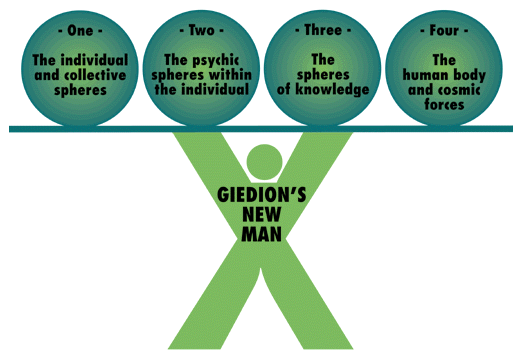
A. Man benefits and man suffers.
Luddites, early 19th century English workmen who destroyed labor saving machinery as a protest, foresaw the negative effects of mechanization. They feared mechanization would eventually replace the need for man. This fear is realized in the writings of Siegfried Giedion regarding the mechanization of bread making, "All operations and machines were coordinated and synchronized with clockwork precision. The manufacture of dough became automatized in all its stages; the loaf obtained extremely even structure and absolute uniformity." (p. 192) With the mechanization of bread making man would no longer have a hand in this organic process--he was no longer needed to knead the dough or help it take its final form, little by little man was removed from the bread making process and replaced by machinery and thereby given the means to move on to higher intellectual challenges.
Much can be learned from Siegried Giedion's writings about mechanization and man. Mechanization has affected man's world in many ways--disadvantages such as the depletion of man from the work place; the restructuring of society; the separation of man from the environment and centralization of industry and advantages such as high-quality consumer products, better working conditions and higher intellectual challenges reflect the effects of mechanization.
The computerization movement will continue to affect our daily lives in many of the same ways the mechanization movement has affected us. The ideology behind the mechanization movement has resurfaced as the computerization movement--we are again massively assessing our developmental processes and trying to understand how we can best utilize a new technology--but, we must begin to focus on our place within these processes and consider the consequences of our decisions more seriously--what we do now will inevitably affect man's future.
When computerization proceeds enthusiastically unchecked, it both flourishes and fails in its relationship to man. Computerization flourished when it offers man a benefit (e.g. the convenience of the 24-hr. banking machine) and fails when it degrades man (e.g. firing a bank teller who is no longer needed to conduct banking transactions). While many industries have been affected positively and negatively by computerization, we must recognize that this continual reassessment and creation, while not always perfect, is what projects us into the future and creates new form and content. In this brave new world we must become a society that embraces change while carefully assessing its short-term and long-term effects on the world.
The Four Spheres of the Emerging Dynamic Equilibrium
Giedion suggests we must begin to establish equilibrium in the following four spheres in order to continue man's evolution:

Sphere One: Balance between the individual and collective spheres
"We want neither extreme individualism nor overpowering collectivism: we must distinguish between the rights of the individual and the rights of the community."
Sphere Two: Balance between the psychic spheres within the individual
"Equipoise is lacking between the rational and the irrational; between the past--tradition--and the future--exploration of the unknown; between the temporal and the eternal."
Sphere Three: Balance between the spheres of knowledge
"Inventions and discoveries must be integrated with their social implications."
Sphere Four: Balance between the human body and cosmic forces
The human organism requires equipoise between its organic environment and its artificial surroundings. Separated from earth and growth, it will never attain the equilibrium necessary for life."
With this equipoise in place, man can again begin to assess his physical and mental involvement in various processes and reclaim valuable time needed to move him well beyond his current state and into the future.